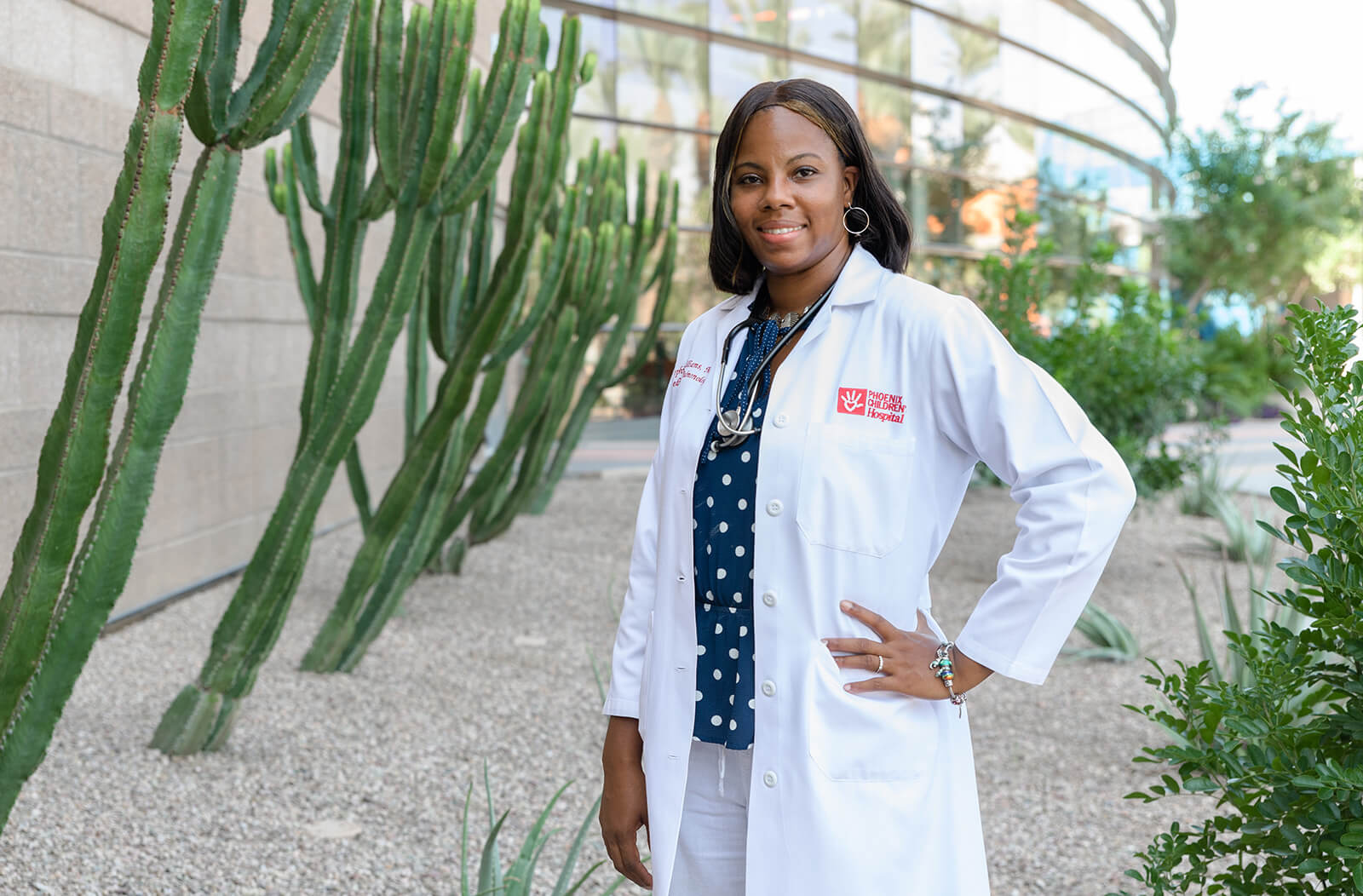
Women in Medicine and Science - Sophia Williams, MD, MPH

Sophia Williams, MD, MPH, is a clinical associate professor of Child Health at the college, as well as the Pediatric Pulmonary Fellowship director and associate director of the Pediatric Cystic Fibrosis Center at Phoenix Children’s Hospital.
Meet Sophia Williams, MD, MPH
Name someone who influenced you and why.
I was fortunate to have met a number of inspirational people over the years. I think though, that the most influential person for me is my mother. She has a strong work ethic. She taught me to work hard, to strive for the best and to always be humble enough to learn from and engage with others throughout my life.
Tell me about a stretch goal you set for yourself and then achieved.
There are not as many women of color in academic medicine. As such, navigating that pathway is often confusing and difficult. One of my goals is to develop a career in academic medicine and achieve rank promotions accordingly. Thankfully, I obtained my first academic promotion this year in 2021.
What barriers did you break to work in your specialty?
For pediatric pulmonary, the number of minorities in the field remains relatively low. As a woman and a woman of color, it was hard to have a "voice." Frequently, my ideas and suggestions for growth and change were ignored. To be recognized and credited as a solid colleague, who was equally as knowledgeable and capable of managing patients and improving systemic issues within health care, was a huge barrier that I needed to overcome. With steady dedication and a patient approach, I was able to wear away the doubts and solidify my abilities in pulmonary medicine.
What is the biggest lesson you have learned so far in your career and why?
The biggest lesson I have learned is that knowledge and ability to grow and learn is infinite. I realized that I can always learn something new from someone else and that knowledge adds to my overall growth as a person and a physician. It also keeps the mind stimulated and excited.
Who paved the way for you and why do you think they helped you?
Many of the minority women in the medical school here in Phoenix, as well as at home in New York, have paved the way for me. Their commitment and work ethics have allowed increased opportunities, as well as overall acknowledgement of the contributions of women in medicine. My colleagues have not only provided awareness of the opportunities and resources, but have also frequently provided guidance and feedback on my own progress within my career. I feel that each of them remembers the barriers they faced during their time and are eager to make it a little easier for the next person entering a similar journey.
Who are you mentoring?
In similar fashion, I am also excited to help the "next generation." I currently mentor one pediatric resident and one college student about to start medical school this fall. I was previously mentoring two medical students in research capacities, both of whom successfully presented posters and discussions at national pulmonary conferences. Lastly, I remain active as a faculty advisor for the medical school group — White Coats 4 Black Lives (WC4BL). Among hosting many panel discussions and events, the group successfully launched a mentorship program between the medical students and several physicians at Phoenix Children’s Hospital.
Read all of our Women in Medicine and Science: Breaking Barriers, Leading Change profiles.
About the College
Founded in 2007, the University of Arizona College of Medicine – Phoenix inspires and trains exemplary physicians, scientists and leaders to advance its core missions in education, research, clinical care and service to communities across Arizona. The college’s strength lies in our collaborations and partnerships with clinical affiliates, community organizations and industry sponsors. With our primary affiliate, Banner Health, we are recognized as the premier academic medical center in Phoenix. As an anchor institution of the Phoenix Bioscience Core, the college is home to signature research programs in neurosciences, cardiopulmonary diseases, immunology, informatics and metabolism. These focus areas uniquely position us to drive biomedical research and bolster economic development in the region.
As an urban institution with strong roots in rural and tribal health, the college has graduated more than 1,000 physicians and matriculates 130 students each year. Greater than 60% of matriculating students are from Arizona and many continue training at our GME sponsored residency programs, ultimately pursuing local academic and community-based opportunities. While our traditional four-year program continues to thrive, we will launch our recently approved accelerated three-year medical student curriculum with exclusive focus on primary care. This program is designed to further enhance workforce retention needs across Arizona.
The college has embarked on our strategic plan for 2025 to 2030. Learn more.